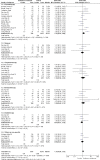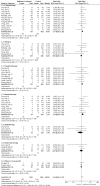The effect of anticancer treatment on cancer patients with COVID-19: A systematic review and meta-analysis
- PMID: 33381923
- PMCID: PMC7897967
- DOI: 10.1002/cam4.3692
The effect of anticancer treatment on cancer patients with COVID-19: A systematic review and meta-analysis
Abstract
Background: The relationship between cancer and COVID-19 has been revealed during the pandemic. Some anticancer treatments have been reported to have negative influences on COVID-19-infected patients while other studies did not support this hypothesis.
Methods: A literature search was conducted in WOS, PubMed, Embase, Cochrane Library, CNKI and VIP between Dec 1, 2019 and Sept 23, 2020 for studies on anticancer treatments in patients with COVID-19. Cohort studies involving over 20 patients with cancer were included. The characteristics of the patients and studies, treatment types, mortality, and other additional outcomes were extracted and pooled for synthesis. RRs and forest plots were adopted to present the results. The literature quality and publication bias were assessed using NOS and Egger's test, respectively.
Results: We analyzed the data from 29 studies, with 5121 cancer patients with COVID-19 meeting the inclusion criteria. There were no significant differences in mortality between patients receiving anticancer treatment and those not (RR 1.17, 95%CI: 0.96-1.43, I2 =66%, p = 0.12). Importantly, in patients with hematological malignancies, chemotherapy could markedly increase the mortality (RR 2.68, 95% CI: 1.90-3.78, I2 =0%, p < 0.00001). In patients with solid tumors, no significant differences in mortality were observed (RR 1.16, 95% CI: 0.57-2.36, I2 =72%, p = 0.67). In addition, our analysis revealed that anticancer therapies had no effects on the ICU admission rate (RR 0.87, 95% CI: 0.70-1.09, I2 =25%, p = 0.23), the severe rate (RR 1.04, 95% CI: 0.95-1.13, I2 =31%, p = 0.42), or respiratory support rate (RR 0.92, 95% CI: 0.70-1.21, I2 =32%, p = 0.55) in COVID-19-infected patients with cancer. Notably, patients receiving surgery had a higher rate of respiratory support than those without any antitumor treatment (RR 1.87, 95%CI: 1.02-3.46, I2 =0%, p = 0.04).
Conclusions: No significant difference was seen in any anticancer treatments in the solid tumor subgroup. Chemotherapy, however, will lead to higher mortality in patients with hematological malignancies. Multicenter, prospective studies are needed to re-evaluate the results.
Keywords: COVID-19; cancer; chemotherapy; hematological malignancy.
© 2020 The Authors. Cancer Medicine published by John Wiley & Sons Ltd.
Conflict of interest statement
All authors declare no competing interest.
Figures





References
-
- World Health Organization . Coronavirus disease (COVID‐19) pandemic. https://www.who.int/emergencies/diseases/novel‐coronavirus‐2019. Accessed 17 Oct 2020.
-
- WHO International Agency for Research on Cancer . Latest global cancer data: Cancer burden rises to 18.1 million new cases and 9.6 million cancer deaths in 2018. https://www.who.int/cancer/PRGlobocanFinal.pdf. Accessed 24 July 2020.
Publication types
MeSH terms
Substances
Grants and funding
LinkOut - more resources
Full Text Sources
Medical
Research Materials

